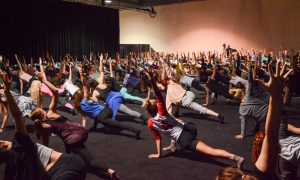Discipline in dance class is one of the most important tools for a successful career. The practice starts during early training and continues through every class you’ll ever take. A disciplined approach to dancing benefits any dancer, regardless of where you are in your career.
Dance discipline comes in many forms: arriving to class on time (read: early), knowing the combination, wearing appropriate clothes and shoes, and executing proper studio etiquette.
But what is etiquette? It means respecting the other people in the room — in short, be cool! In general, modern culture has loosened many classical tenets of etiquette, but in the studio, traditional dance etiquette should remain intact. Check out these key pieces of advice to make sure you have a successful class that respects the teacher, musicians, and fellow dancers in the room.
#1. Understand spatial awareness.
Dance studios are often crowded and everyone moves around a lot! Understand what you’re doing with your body and how it affects those around you. If you accidently bump someone or get too close, quietly apologize after the combo is over.
#2. Take every correction as if it was directed to you.
Teachers can’t always see what every dancer does or doesn’t do. If you assume every correction given applies to you, the class will move along quicker, you will become a more skilled dancer, and you will remain engaged in the class.
#3. Don’t yawn, cross your arms, roll your eyes or chew gum.
We all do all of these things. In a dance class, however, they indicate disinterest. If you seem disinterested in the teacher, don’t expect the teacher to give you much attention.
#4. Do not bring coffee or cell phones to the ballet barre.
Trust me, I get it. Class often comes early and we dancers live on coffee, but grand battements and lattes don’t mix. Similarly, having your phone at barre is both unnecessary and a distraction – for you and for others. Outside of an emergency, there is no reason to have a phone at barre.
#5. Follow the rules of groups in a ballet class.
If the teacher says switch lines in center, do it! If you are uncomfortable in the front, ask yourself why and solve the problem. Moving slightly forward, but not all the way, gives everyone behind you less space. Once your group is done, move to the side of the room, and make it clear you are not in the group that’s dancing.
#6. Do not block the piano and the view of the accompanist.
Musicians playing for class have jobs to do, and they need to see the room to provide the best music. Position yourself in a way that allows them to be successful.
#7. Understand your level placement.
Open classes are just that – open. But they are level-based. Taking a class too far above your level can be dangerous for you and for others: there are certain expectations at each level of class. It also may impede your improvement to take a class that moves too quickly, and has instruction is based on a common level of training background.
#8. Don’t talk.
Ninety-nine percent of the time, it is not appropriate. Just don’t do it.
Knowing how to act when you’re not dancing is a valuable skill in the professional world. Etiquette goes a long way, and will be noticed in class, auditions and by company directors, so remember these tips and prepare for success!
By Emily Sarkissian of Dance Informa.















